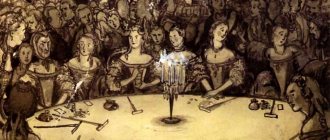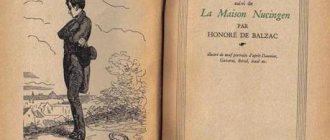280 years ago, on January 28, 1741, Princess Natalya Petrovna Golitsyna , née Chernysheva . It is believed that it was she who became the prototype of the princess from A. S. Pushkin’s “The Queen of Spades.” The same one who advised Herman the supposedly lucky combination “three, seven, ace.”
“The Queen of Spades”, in modern terms, is dedicated to the problem of gambling addiction. This destructive passion drives the main character to a madhouse.
The main character Herman, unlike the old countess, did not have a real prototype, but the fate of the players who end their lives in a madhouse is by no means a fiction. As well as the fate of those who went to prison because of debts, whose families were destroyed. The great poet himself once seriously stumbled at a card game. Pushkin lost the amount that he had to pay for several years. This happened on the eve of the poet’s wedding with Natalya Goncharova , which almost upset the engagement. In a letter to a friend, Pushkin complained: “Moscow gossip reaches the ears of the bride and her mother - henceforth quarrels, caustic circumlocutions, unreliable reconciliations...” It is possible that the story “The Queen of Spades”, written later, became a kind of warning for those who submitted to gambling passion , became a toy in her hands, forgetting about the true values of life.
Visiting the Queen of Spades. St. Petersburg addresses of literary heroes Read more
The idea and history of Pushkin’s creation of “The Queen of Spades”
It is not known for sure, but it is assumed that the story “The Queen of Spades” was conceived by Pushkin in 1828, completed on the Boldino estate in the Nizhny Novgorod province in the fall of 1833. Its writing was based on an incident told to the poet by Prince Golitsyn, about how he, who lost in cards, we managed to win back. He bet money on the cards predicted by his grandmother N.P. Golitsyna, a former influential person at court and a maid of honor under five emperors. According to family legend, in her youth, Natalya Petrovna Golitsyna, living in Paris, made acquaintance with the famous magician or adventurer Saint Germain [1], who told her a certain secret of a card game. Pushkin came up with an entertaining plot with an interesting interpretation for this story[2].
The story “The Queen of Spades” occupies a special place in Pushkin’s prose. Unlike his other realistic works, “The Queen of Spades” contains astral[3] forces that influence a person’s fate. The theme of fate and chance was of interest to Pushkin, who believed that the human mind can, based on the general course of things, make “deep assumptions, often justified by time,” but it is not able to foresee chance, which is “a powerful and instantaneous instrument of providence.” In addition, the poet, not from rumors, but from personal experience, knew the passion for the card game, so popular in his time. Cards were a kind of toolkit in the game with fate; they used them to tell fortunes, trying to predict the future.
After the story was published in the magazine “Library for Reading” in 1834, it received many positive reviews and became so popular that players preferred to bet on the magic combination: “three, seven, ace.” In his diary, Pushkin wrote: “My “Queen of Spades” is in great fashion.”
Problems
- Greed . Having an insidious plan to profit from the secret, Hermann does not bother to fulfill her posthumous request, and neglects the fact that she came to him not of her own free will, but by decree given from above. He does not spare the feelings of Elizaveta Ivanovna, who managed to trust him and be imbued with tender love messages. The main problem of the work “The Queen of Spades” is the main character’s prudence, which has a negative impact on his life.
- Hypocrisy . With his help, Hermann manages to deceive not only the gullible girl, but also the whole world, which takes his success at face value. Everyone around envy the player's luck, wish him defeat, but maintain an appearance of respect and goodwill. This lie permeates the entire high world.
- dependence on material goods. The hero fiercely seeks wealth for the sake of recognition from those around him, because in the world of salons and balls only money is valued. The problem is not in one person, but in a system where everything has its monetary equivalent.
The main content of “The Queen of Spades”, the composition of the work, the meaning of the title, epigraph
Pushkin defined the genre of “The Queen of Spades” as a story. Although Belinsky and many other critics considered this work a story limited to one plot line and a small number of characters. The plot of “The Queen of Spades” intertwines features of romanticism and realism; later the story began to be classified as a movement of mystical realism. There is a romantic touch to the features and some of the actions of the main character, at the same time, having touched an otherworldly secret, he uses it to realize his mercantile everyday plans.
The work is filled with fantastic images and mystical events, between which there is a certain relationship, noted in the title of the story and the epigraph. The title “Queen of Spades” indicates the game card that destroyed the life of the main character, and the epigraph contains its symbolic meaning in fortune telling as “secret malevolence.” The composition of “The Queen of Spades” consists of 6 parts and a laconic epilogue of 5 sentences. In the first part, the plot begins, in the third, the climactic scene of the death of the old countess, in the sixth, the denouement is given in the scene of the protagonist’s loss.
The plot of “The Queen of Spades” is based on the story of a young military engineer, Hermann, whose name reveals him to be a Russified German. The introduction to the hero occurs at the very beginning of the work. On a long winter night, having finished a card game in the morning with Horse Guardsman Narumov, its participants began to talk. Prince Paul Tomsky told the story of his grandmother, Countess Anna Fedotovna, who happened to learn a winning combination of cards from the famous Parisian occultist[4] Saint-Germain. She used this secret twice. Once, in order to get even, the second time, out of pity, she helped a certain young man Chaplitsky with the condition of never playing again, which, apparently, he did not do and died in poverty, having squandered his fortune of millions. But she did not reveal her secret to any of her four sons, who were desperate gamblers, or her grandchildren.
The players did not take Tomsky’s story seriously, only Hermann, who did not take part in the game, became interested in this “fairy tale.” Insidious thoughts arise in his head and a plan begins to formulate to obtain the secrets of the treasured cards from the old countess. He goes to the countess's house and stands under her windows. He begins to write love messages to her pupil Elizaveta Ivanovna, achieves reciprocity and persuades her to go on a night date. Having entered the house thanks to Lisa, Hermann tries, first by persuasion, then by threats, to extract the secret from the countess. The old woman, unable to bear the fear, dies.
Then strange things begin to happen to Hermann: at the funeral he imagines that the old woman lying in the coffin squinted mockingly, and at night he sees her ghost at home revealing a card combination. His imagination was completely consumed by the idea of taking advantage of the secret that had been revealed to him. Soon he had an opportunity: the famous experienced player Chekalinsky came to St. Petersburg. Hermann wins against him twice, but the third time, having mixed up the card, he loses everything. Looking at the card in his hands, it seems to him that the “queen of spades” grinned. A broke young man ends up in a psychiatric hospital.
The essence of the game called “Pharaoh”, in which two players participate, is interesting. One pulls out a card from his deck and bets on it. Another from his deck begins to throw cards into two piles. In whose direction the hidden card falls, he wins. In this simple and completely unpredictable game, cheating tricks and card miscalculation are impossible. Players rely only on luck and chance. The actual process of playing cards in the story is not shown until the last episode. From the first page, the card game becomes only a topic for conversation, at first in the form of a harmless and funny anecdote about the Countess. On the last page it turns out that the story associated with the game is sad and fatal. The game in the plot is endowed with mysterious, fantastic possibilities. “Three True Cards” is shrouded in the mysteries of cabalism (the story of Saint Germain), the mysticism of revelation from beyond the grave (the appearance of the ghost of the deceased countess). By the end of the first chapter, for Hermann, the game is perceived as a “fairytale” opportunity to get rich, after which it begins to demonically take possession of his consciousness.
the main idea
The story of Alexander Sergeevich Pushkin makes you think: is dubious luck worth unjustified risk? After all, having once felt like a favorite of fortune, a person begins to get involved in the game, it becomes difficult for him to overcome the dependence on the constant feeling of excitement. But this is only one facet of the work. The idea that Alexander Sergeevich Pushkin pursued is an ironic embodiment of a typical romantic hero, who is not for nothing that he is German. Romanticism originated from Germany, and the author was critical of it. For example, he ironized about his canons, which were far from real life, even in “Ruslan and Lyudmila.” The poet condemns the isolation of this trend from reality and the indispensable desire to present it in a bad light. First of all, he criticizes the romantic hero. Accordingly, Hermann, despite his mystical bent and belief in the magic of three cards, remains an ordinary tradesman with a banal set of values. His sublimely ostentatious nature does not change for the better from magic, because he uses it for greedy purposes. That is, the main idea of “The Queen of Spades” is that no external romantic attributes such as mysticism, excitement and extraordinary character will help the character get rid of the vanity and abomination of the material world, but will only justify his immorality, make crime possible, because the essence of a romantic hero is confrontation with society. It can easily take this form, and this is the danger of the German cult of individualism - the belief in the superiority of the individual over society. Therefore, the ending of the book proves the opposite: society is superior to Hermann, who violated its laws. The point of “The Queen of Spades” is to show the inevitability of punishment for a crime committed. Having learned three treasured cards, thanks to which it was possible to increase his fortune several times, the player could not control himself and lost his mind.
The system of images in “The Queen of Spades”. Image of Hermann
The essence of the problem of man and fate. The meaning of symbolic and fantastic images
The central character of the story “The Queen of Spades,” Hermann, spends his nights in the company of players, but does not pick up cards himself, although he is a passionate gambler at heart. He liked to watch other gamblers play, trying to figure out the winning system. He himself did not allow himself to risk money; he led a very modest lifestyle, having little capital and living on a modest salary. He is obsessed with getting rich.
Hermann considered “calculation, moderation and accuracy” to be his trump cards in life. He is a rational person who does not believe in the triumph of chance. What convinced him of Tomsky’s story was not so much the story of the countess’s winnings, but rather its repetition with Chaplitsky, to whom the secret was revealed. A one-time win could have been an accident, but the repetition of accidents becomes a pattern. But the calculating Hermann miscalculated in the most ominous way. Thinking that the desired secret would serve his purposes, he himself found himself in the power of this secret. The young man does not notice his own addiction, which begins to manifest itself in his thoughts, actions and dreams.
He dreams of a game in which he constantly wins gold and banknotes[5], waking up and sighing about the loss of his supposedly fantastic wealth. Wandering around St. Petersburg, he, as if guided by an unknown force, always comes to the old mansion of the countess. His consciousness is subject to the mystery of numbers, the meaning of which is not yet clear. He dreams that he could “triple, seventeen” his fortune, giving himself “peace and independence.” The cherished cards are already imprinted in his subconscious: “three”, “seven” and “ace”, which represents “peace and independence”, the most important card in terms of status. Despite these oddities, Hermann systematically thinks through a way to seduce Lisa and penetrate the Countess.
Hermann, standing under Lizaveta Ivanovna’s windows, seems to her like a hero from a novel: he hides his face in a beaver collar, his black eyes sparkle, his pale cheeks flash with blush. Tomsky, telling Lisa about Hermann, noted that he had a “truly romantic face,” with “the profile of Napoleon” and “the soul of Mephistopheles.”
Having achieved a meeting and received a detailed description of the house in a letter from Lisa, he enters the old countess’s chambers, trying to find out the desired secret. In his convictions, he gives the countess a lot of arguments: from the possibility of making him happy, as a thrifty and worthy person, to the willingness to accept her sins on his soul, but to honor her “as a shrine.” Realizing that the old woman has died, Hermann goes to Lisa’s room for an explanation, but not a loving one, because there is no longer a need for that. Lisa understands that the basis of her “romantic” hero’s actions was passion, but not for her, but for money, which “his soul yearned for.” In the image of Hermann, Pushkin for the first time showed the emerging bourgeois world with crushed passions, ruled by money. Although the hero's appearance has Napoleonic and demonic features, his evil is petty, he just wants to get rich, thinking in an accounting way to calculate his fate.
Even having decided to repent at the old woman’s funeral for being the culprit of her death, he does this out of fear that the spirit of the deceased can have a bad influence on his life. Bending over the old woman’s coffin, he imagines her unkind smile, and he loses consciousness. From the experience of nervous shock and drinking wine at night, the ghost of an old woman appears to him either in reality or in a dream and tells him the treasured cards: “three, seven, ace,” promising his forgiveness if he marries her pupil. After this, Hermann was completely taken over by the game of mind with fate, and was haunted everywhere by the “idea fixe[6]” of the three cards, the names of which moved on his lips. Everything that surrounded him resembled these cards, into which he began to attach the meaning of symbolic images. A stately girl seemed to him like a “three of hearts,” he compared a pot-bellied man with an “ace,” and if he was asked about the time, he answered: “It’s five minutes to seven.” In the fantastic images of disturbing dreams, the “ace” seems to him like a spider, the “seven” like a Gothic gate, the “three” like a lush flower.
Having decided to resign and go abroad, Hermann is looking for a suitable opportunity to play, but chance itself finds him, saving him from unnecessary hassle. With the appearance of the major player Chekalinsky in St. Petersburg, his fate is decided. During the game, Hermann remains restrained and calculating, confident that he knows the “law” of the case. Following the old woman’s instructions, he bets only one card during the evening and wins twice in a row. It’s surprising that the old woman didn’t deceive him: all three cards won. The pattern has been proven. But Hermann himself inadvertently “got it wrong” by placing a queen instead of an ace. This means that the unpredictable power of chance has been proven. His capital, “tripled, seventeenth” in two evenings to 94 thousand, goes to the “ace” Chekalinsky. Hermann is left with only the “Queen of Spades” in his hands, repeating the grin of the late countess with a narrowed eye. Chekalinsky’s words addressed to his losing opponent sound ambiguous: “Your lady has been killed.” They, which in the language of gamblers mean the result of the game, also represent an expression referring to the real, albeit involuntary, murder of the old woman.
The image of the Queen of Spades echoes the image of Countess Anna Fedotovna, a rich old lady, a former beauty and socialite, a gambling gambler in her youth. According to rumors, she is the keeper of the secret of the “three cards”, revealed to her during her stay in Paris by a famous mystic. In the house of the 87-year-old countess, time seemed to have stopped; the interior items and toilets of the old lady were in the fashion of the 18th century. emphasize the old-fashionedness and dilapidation of their mistress. Anna Fedotovna’s character is grumpy; with her whims and whims, she torments not only the servants, who secretly rob the crazy old woman, but also her poor pupil Lizaveta Ivanovna. The Countess, who seemed already dead during her life, seems to come to life after death. Her ghost, as a product of dark forces, appears to Hermann, shuffling with slippers, and is ready to make a deal with a man who has become a victim of his own greed. The dead old woman tells him a demonic secret “against her will,” but shows personal mercy, promising to forgive her death on the condition of marrying Lisa. Perhaps the loss of Hermann, who did not fulfill the conditions, was the old woman’s mystical revenge. After all, earlier Chaplitsky, having violated the countess’s ban on not playing anymore, died a beggar. The Countess in the guise of the Queen of Spades, mocking the hero, laughs at him, depriving him of everything, driving him to madness.
Lizaveta Ivanovna lives in the house of her “benefactor” in a humiliated position. Forced to accompany her mistress on walks and balls, she could not help but understand her pitiful position in the “big world.” Despite the fact that she was prettier than many of her peers, she did not enjoy success; gentlemen hung around rich brides. This hurt her pride. Young people invited her only when there was no couple; ladies noticed her only when they needed help. But she waited for her “deliverer” to appear someday. Without the possibility of a “worthy” acquaintance, she began to pay attention to the military engineer under her windows, and over time, respond to his love letters. Having become Hermann's unwitting accomplice, after an ill-fated meeting she understands his true intentions. But unlike her calculating failed lover, she arranged her destiny and got married successfully, although given her position she could not count on a happy marriage.
What does it teach?
After reading “The Queen of Spades,” the reader involuntarily thinks about the negative impact of the desire for constant profit. Huge sums of money attract people to return to the card table again and again. Based on Hermann’s negative example, we can conclude that you should not chase easy money, thereby tempting fate. The path to the goal, even if this goal is well-being, must be honest and worthy.
In addition, the nobility of a person is measured not by the fullness of the wallet, but by the wealth of the soul. Only those who cultivate true virtue in themselves are worthy of respect and happiness. Love, sincerity and friendship cannot be bought with a card win, no matter what it is.
Image of St. Petersburg. The role of the epilogue
In The Queen of Spades, Pushkin first presented the image of St. Petersburg as a city of the absurd, in which the lines between reality and fantasy are blurred. The northern capital is shown not as the cultural center of the state, but as a place in which moral principles are vulgarized, feelings, thoughts and actions are trivialized. St. Petersburg, with its “rainy days” and “long winter nights”, is depicted as a city of players engaged in “business”, ready to risk everything for the sake of base desires and goals.
St. Petersburg, like an invisible ghost or vision, subjugates its inhabitants to its power. In The Queen of Spades there are supposedly “random” moments associated with the city. So, Hermann, wandering around St. Petersburg, immersed in his thoughts about the countess’s secret, “accidentally” found himself at a house of “ancient architecture” on one of the central streets and learns that this is her mansion. He was led to this house by some “unknown force.” A city hostile to man makes his life illusory, absurd, filled with falsehood, self-interest, and deprives him of his mind. The theme of St. Petersburg discovered by Pushkin will be continued in the works of Gogol, Dostoevsky and others.
In the epilogue, consisting of only five sentences, it becomes known that the failed “Napoleon” and “Mephistopheles” in one person is in the Obukhov psychiatric clinic, muttering the same thing: “Three, seven, ace! Three, seven, queen." Lizaveta Ivanovna is married to the wealthy son of the former manager of the old countess, and a certain poor relative is being brought up in her house. The grandson of the Countess and friend of Hermann Tomsky was promoted to captain [7] and married successfully. From this laconic conclusion it follows that Providence decided the destinies of the heroes in its own way, confusing the cards, disrupting plans, presenting an unexpected win. Fate took away Hermann's mind, with the help of which he intended to outwit her. Lisa, who did not expect anything good from life, found prosperity and a family. “The idle lucky man” Tomsky undeservedly becomes increasingly rich, having received a rank, inheritance and dowry of a rich bride.
Themes
The main theme of the story is fate
. The author poses the question: can a person control it with the help of secret knowledge? Apparently not, because the hero, who dared to fight inexorable fate, lost miserably to him and, moreover, was punished for his audacity. People, according to Pushkin, should not try to conquer what is not under their control.
Theme of justice
. What goes around comes around - there can be a conclusion from this story. After all, if we follow the heroes, then without much thought it becomes clear to us that Hermann, as a punishment for his dark thoughts, loses at cards and goes crazy, and the same Elizabeth, the “poor pupil” of the countess, endures all the bullying only for the sake of money, and not because pure thoughts. As a result, evil arises within her. After finding her own pupil, Lisa embarks on the path of the same inner callousness as the old woman tormentor.
Mystical theme. Pushkin describes the magical power of cards, plunging the reader into illusion. He doesn’t fully know whether the magic lies in the mysterious combination, or is all this just a game of the sick imagination of Hermann, a German romantic, who could not have come up with such a thing? Even in the finale there is no direct answer; the author maintains the intrigue until the end, allowing dreamers to think that the character was truly punished by fate itself.
Genre composition
"The Queen of Spades" in its literary genre is defined as a story. This implies a small volume, one main plot and the participation of secondary characters in the work. Researchers claim that this book was the first work of Alexander Sergeevich, which opened a cycle of subsequent thoughts about the vices of people and the punishment that would follow.
The main direction is romanticism , in which an imaginary world appears in the real one, and even a very insightful reader cannot know for sure whether magic actually happened or whether the author simply described the hero’s dream. In Pushkin’s story it is also not clear who was able to drive Hermann to the point of losing his mind: a big loss or card magic. One way or another, this character’s desire to get rich by any means is ridiculed and punished.





